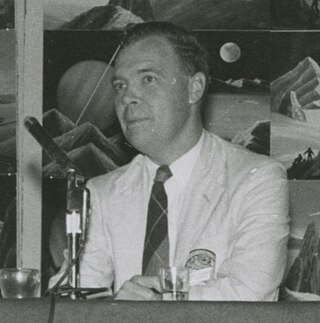
Harry Clement Stubbs, better known by the pen name Hal Clement, was an American science fiction writer and a leader of the hard science fiction subgenre. He also painted astronomically oriented artworks under the name George Richard.

John Wood Campbell Jr. was an American science fiction writer and editor. He was editor of Astounding Science Fiction from late 1937 until his death and was part of the Golden Age of Science Fiction. Campbell wrote super-science space opera under his own name and stories under his primary pseudonym, Don A. Stuart. Campbell also used the pen names Karl Van Kampen and Arthur McCann. His novella Who Goes There? was adapted as the films The Thing from Another World (1951), The Thing (1982), and The Thing (2011).

Murray Leinster was a pen name of William Fitzgerald Jenkins, an American writer of genre fiction, particularly of science fiction. He wrote and published more than 1,500 short stories and articles, 14 movie scripts, and hundreds of radio scripts and television plays.
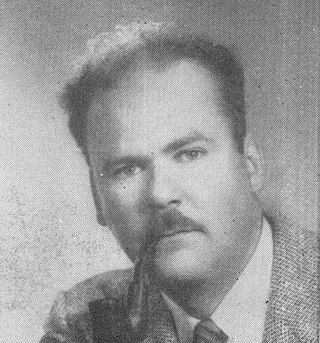
Dallas McCord "Mack" Reynolds was an American science fiction writer. His pen names included Dallas Ross, Mark Mallory, Clark Collins, Dallas Rose, Guy McCord, Maxine Reynolds, Bob Belmont, and Todd Harding. His work focused on socioeconomic speculation, usually expressed in thought-provoking explorations of utopian societies from a radical, sometime satiric perspective. He was a popular author from the 1950s to the 1970s, especially with readers of science fiction and fantasy magazines.
Christopher Anvil is a pseudonym used by American author Harry Christopher Crosby.

A science fiction magazine is a publication that offers primarily science fiction, either in a hard-copy periodical format or on the Internet. Science fiction magazines traditionally featured speculative fiction in short story, novelette, novella or novel form, a format that continues into the present day. Many also contain editorials, book reviews or articles, and some also include stories in the fantasy and horror genres.
The Golden Age of Science Fiction, often identified in the United States as the years 1938–1946, was a period in which a number of foundational works of science fiction literature appeared. In the history of science fiction, the Golden Age follows the "pulp era" of the 1920s and '30s, and precedes New Wave science fiction of the '60s and '70s. The 1950s are, in this scheme, a transitional period. Robert Silverberg, who came of age then, saw the '50s as the true Golden Age.

James Henry Schmitz was a German-American science fiction writer.
"The Men and the Mirror" is a short science fiction story by American writer Ross Rocklynne, published in Astounding Science Fiction in July 1938, since reprinted in Rocklynne's collection of the same title (1973) and in Isaac Asimov's anthology Before the Golden Age (1974). The story is one of three stories by Rocklynne featuring the protagonist Jack Colbie of the Interplanetary Police and his pursuit of interplanetary criminal Edward Deverel.
Theodore Lockard Thomas was an American chemical engineer and patent attorney who wrote more than 50 science fiction short stories, published between 1952 and 1981. He also collaborated on two novels with Kate Wilhelm, as well as producing stories under the pseudonyms of Leonard Lockhard and Cogswell Thomas, and was nominated for the 1967 Nebula Award for Best Short Story and for a Hugo Award.
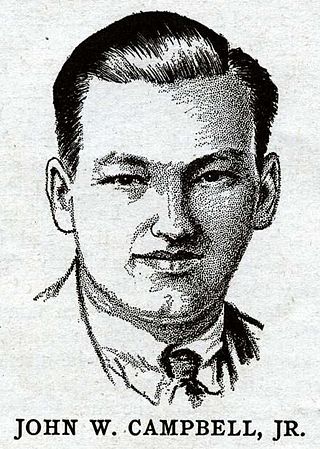
This is a bibliography of works by American writer John W. Campbell Jr.
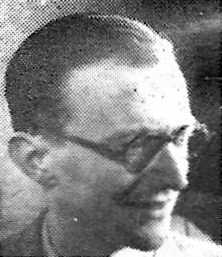
James Murdoch MacGregor was a Scottish journalist and author best known for writing science fiction under the pen name J.T. McIntosh.
The complete bibliography of Gordon R. Dickson.

The Best of Frank Herbert (1975) is a collection of thirteen short stories by American science fiction author Frank Herbert and edited by Angus Wells. In 1976 this book was re-released as a two volume set; The Best of Frank Herbert 1952–1964 and The Best of Frank Herbert 1965–1970. All of the stories in this collection had been previously published in magazine or book form.
"Uncommon Sense" is a 1945 science fiction short story by American writer Hal Clement. In 1996, it was retrospectively awarded the 1946 Hugo Award for Best Short Story.
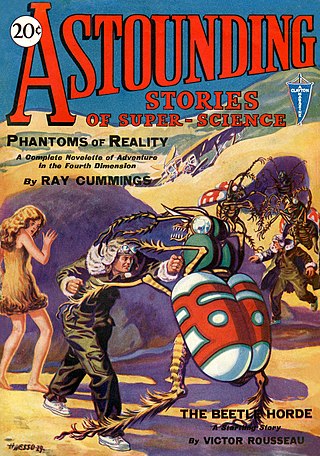
Analog Science Fiction and Fact is an American science fiction magazine published under various titles since 1930. Originally titled Astounding Stories of Super-Science, the first issue was dated January 1930, published by William Clayton, and edited by Harry Bates. Clayton went bankrupt in 1933 and the magazine was sold to Street & Smith. The new editor was F. Orlin Tremaine, who soon made Astounding the leading magazine in the nascent pulp science fiction field, publishing well-regarded stories such as Jack Williamson's Legion of Space and John W. Campbell's "Twilight". At the end of 1937, Campbell took over editorial duties under Tremaine's supervision, and the following year Tremaine was let go, giving Campbell more independence. Over the next few years Campbell published many stories that became classics in the field, including Isaac Asimov's Foundation series, A. E. van Vogt's Slan, and several novels and stories by Robert A. Heinlein. The period beginning with Campbell's editorship is often referred to as the Golden Age of Science Fiction.
This is a list of works by the science fiction author Frank Herbert.

Eight Fantasms and Magics is a collection of science fiction and fantasy stories by Jack Vance. It was originally published by Macmillan in 1969 and reprinted in paperback by Collier Books in 1970. No further editions have been issued.

Analog: Writers' Choice, Volume II is the eighth in a series of anthologies of science fiction stories drawn from Analog magazine and edited by then-current Analog editor Stanley Schmidt. It was first published in paperback by Davis Publications and hardcover by The Dial Press in 1984.

The Best of Hal Clement is a collection of science fiction short stories by American author Hal Clement, edited by Lester del Rey. It was first published in paperback by Del Rey/Ballantine in June 1979 as a volume in its Classic Library of Science Fiction. It was reissued in ebook by Gateway/Orion in May 2013, and in trade paperback and ebook by Phoenix Pick in December 2014.













